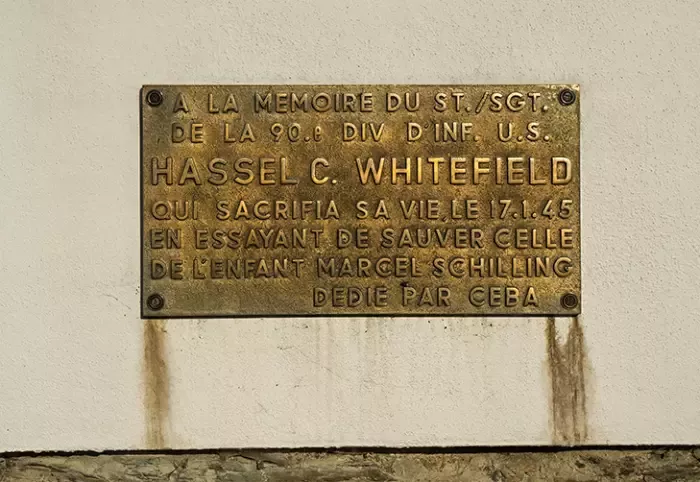Cover Story: 75 Years Later, an Inside Look of Heroism During Battle of the Bulge

Seventy-five years ago this month, on 17 January 1945, the so-called “Battle of the Bulge” had pretty much ended. American and British troops had flattened the December German protrusion into Luxembourg and Belgium. A desperate German rear guard was trying to stem an inexorable Allied advance eastwards. Nowhere was that more evident than in the tiny Luxembourg village of Oberwampach located close to the Belgian border. The next step to the rear for the Germans was into their homeland. Their commanders were determined to stop the U.S. Army’s 358th Infantry Regiment of the 90th Infantry Division from driving them out of their defensive positions.
There were many tragedies that cold snowy day, but there was one particularly poignant one. It involved trying to save the life of a young Luxembourg boy, five year old Marcel Schilling, and an American sergeant, Staff Sergeant Hassel C.Whitefield. The soldier died of his wounds. The boy died in his mother’s arms.
Those who have witnessed the destruction of buildings in this century’s combat can, to some extent, appreciate the condition of those in Oberwampach. Few walls remained intact. Everywhere there were only splintered shells of houses, shops, and barns standing. There was hardly a structure that was not a pile of rubble. The only places where there was a modicum of safety were cellars. Both Germans and Americans fought for them while the Luxembourg townspeople remaining among the debris cowered terrified in any available cellar corner space.
Sergeant Whitefield was a member of a forward observer party of the 344th Field Artillery Battalion providing fire support for the 358th Infantry. His small team was invariably always in a precarious position as it had to be located on the front lines to call for and adjust supporting fires. There Whitefield could often almost look into his enemy’s eyes as he and/or his lieutenant called for rounds of artillery projectiles to be fired at enemy targets. His role was obviously one of great danger and casualties among forward observers were always high. One learned quickly to protect oneself in this hazardous position and did not take unnecessary chances.
During this day’s battle Whitefield ended up in the smashed house of the Schilling family who were taking refuge from the fighting. One of the occupants of the building was young Marcel who was being terrorized by the crashing noises heavy German mortar barrages were making outside the house. It seemed that any second a round would land on the cellar in which he was shivering with fright. For him it soon became a matter of stay or flee. Marcel was not to be restrained.
He ran out of the house and into the street just as a German barrage of shells landed nearby. But he was not alone as just behind him was Whitefield. Disregarding his own safety as German mortar rounds exploded, Whitefield had run out of the house, grabbed the boy and covering him with his body they started running back to safety. He did not make it. Neither did the boy. Stumbling back into the house both died. It was a tragedy for which an American soldier, unhesitatingly and unselfishly paid the ultimate price for an act of love which could never be repaid.
Today Whitefield and his act of selfless bravery are not forgotten. A visit to Oberwampach and its church will reveal a plaque on a wall beside the village’s war memorial commemorating Whitefield’s desperate heroic act (photo, above).
The 75th anniversary of the German desperate winter offensive to capture the Belgian port of Antwerp and the Allied counter measures to defeat it has passed. The flattening of the resulting bulge is also to be remembered. Let us then not forget the tragedies and heroics such as those of the Sergeant Whitefields who performed unselfish acts during those murderous times without giving any thought to their consequences.
Editor’s notes: Staff Sergeant Hassel C. Whitefield was posthumously awarded the Distinguished Service Cross for his heroism in trying to save Marcel Schilling. The author’s father commanded the 359th Infantry Regiment in the 90th Infantry Division at the time of the above action.
Photo Credit: Memorial plate for American soldier Hassel Whitefield, the church of Oberwampach Wikimedia Commons
Brig. General (Ret.) Raymond E. Bell, Jr., PhD, is a writer and noted for his breadth of publications that includes more than 300 pieces covering a wide variety of World War II historical events and current military subjects.



